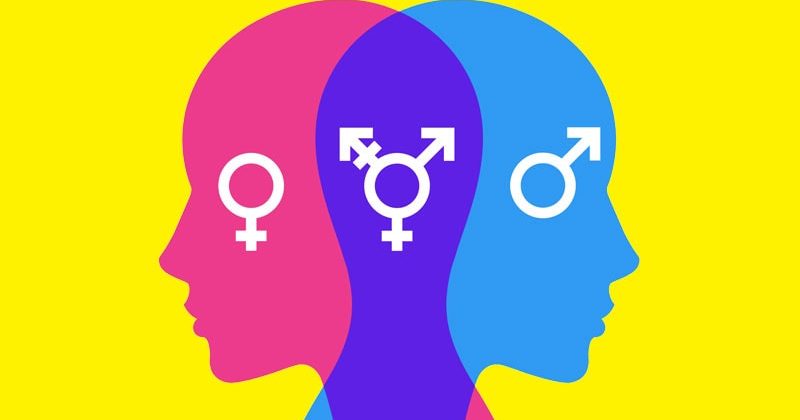France — Demand for gender reassignment surgery in children and adolescents has increased in the United States and Europe over the past few years. For its part, the French National Academy of Medicine has urged that caution be exercised when it comes to the therapies involved and advised that the psychological support phase be extended. The Academy made this statement at the end of February, just weeks after a book came out in which the authors, psychoanalysts Caroline Eliacheff and Céline Masson, warned of the excesses of “transgenderism” when it comes to minors. While the Academy does not mention this highly publicized work, the timing speaks for itself.
Increased Demand for Reassignment
Gender dysphoria is the strong sense, for more than 6 months, of identification with a gender different from that assigned at birth. This feeling can cause significant and prolonged suffering, with the potential to increase the risk for suicide. In recent years, both the United States and Europe have seen marked increases in gender dysphoria — a phenomenon which has long been reported in the medical literature.
The Academy’s press release mentioned that a recent study within a dozen high schools in Pittsburgh, Pennsylvania, revealed a prevalence that was much higher than previously estimated in the United States: 10% of students declared themselves to be transgender or nonbinary or of uncertain gender. In 2003, the Royal Children’s Hospital in Melbourne had diagnosed gender dysphoria in only one child, while today it treats nearly 200. As for France, in 2016 there were 10,000 to 15,000 people who had gender reassignment surgery.
The Making of the Transgender Child
In their book, La fabrique de l’enfant-transgenre (“The Making of the Transgender Child”), published in February, Eliacheff and Masson warn of the excesses of “transgenderism” when it comes to minors. The influence of LGBTQI culture and the power of social networks have brought new visibility to “gender dysphoria.” Given this context, the authors, in the name of protecting children, are concerned that hormone treatments and surgical interventions may end up turning “a healthy child into a patient for life,” and that “there is a risk that the extremely rapid response to affirm this desire to reassign gender will also impair the development of the child’s sense of self.”
Increasing Supply of Care
“The medical demand is accompanied by an increasing supply of care, in the form of consultations or treatment in specialized clinics, because of the distress it causes rather than a mental illness per se,” the Academy wrote in its press release. Many specialties are involved, including psychiatry, endocrinology, gynecology, and sometimes, in the end, surgery.
The Academy advised that “great medical caution” be taken with children and adolescents, given “the vulnerability, particularly psychological, of this population and the many undesirable effects, and even serious complications, that some of the available therapies can cause.” In this regard, the Academy mentioned that in May 2021, Stockholm’s Karolinska University Hospital decided to ban the use of hormone blockers.
The Hospital’s decision was based, in particular, on the report by the UK National Institute for Health and Care Excellence, which found the risk–benefit ratio of this treatment “highly uncertain.” The decision was also influenced by a 2019 review done in Sweden. As reported on the French bioethics news site Gènéthique, the researchers found “a lack of evidence for medical treatments, and a lack of explanation for the sharp increase in the numbers of adolescents presenting with gender dysphoria in recent years.”
Medical and Psychological Support
“Although, in France, the use of hormone blockers or hormones of the opposite sex is possible with parental authorization at any age, the greatest discretion is required in their use,” the Academy emphasized. This is because of the side effects of hormone therapy, such as “impact on growth, bone fragility, risk for sterility, emotional and intellectual consequences, and, for girls, symptoms reminiscent of menopause.”
In addition, whether the surgical treatment is a mastectomy (which is authorized in France from the age of 14) or an intervention involving the external genitalia (vulva, penis), its irreversible nature must be discussed.
“Therefore, faced with a request for care for this reason, it is essential to provide, first of all, medical and psychological support to these children or adolescents, but also to their parents, especially because there is no test to distinguish a ‘structural’ gender dysphoria from transient dysphoria in adolescence,” the Academy wrote. It also stated its position that there is, in fact, a real “risk for overdiagnosis.” That view is based on “the increasing number of transgender young adults wishing to ‘detransition.’ ” According to the Academy, it is therefore advisable “to extend as much as possible the psychological support phase.”
The French National Academy of Medicine draws the attention of the medical community to the increasing demand for care in the context of gender transidentity in children and adolescents and recommends the following:
-
Psychological support as long as possible for children and adolescents expressing a desire to transition, and for their parents as well
-
In the event of a persistent desire for transition, a careful decision about medical treatment with hormone blockers or hormones of the opposite sex within the framework of Multidisciplinary Consultation Meetings
-
The introduction of appropriate clinical training in medical studies to inform and guide young people and their families
-
The promotion of clinical and biological as well as ethical research, a subject that is still too rare in France
-
The vigilance of parents in response to their children’s questions on transidentity or their malaise, underlining the addictive character of excessive use of social media, which is both harmful to the psychological development of young people and partly responsible for the growing sense of gender incongruence.
For more news, follow Medscape on Facebook, Twitter, Instagram, YouTube, and LinkedIn
Source: Read Full Article
